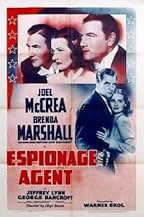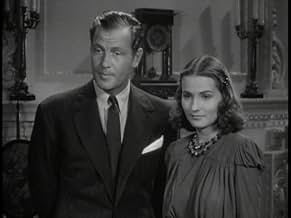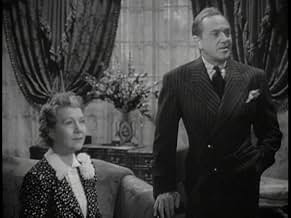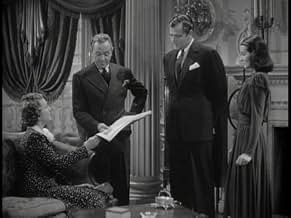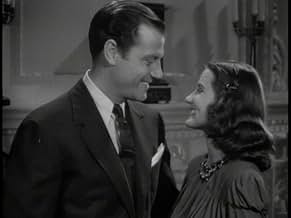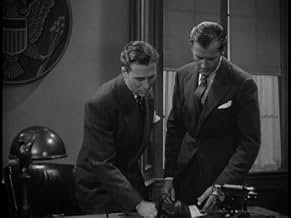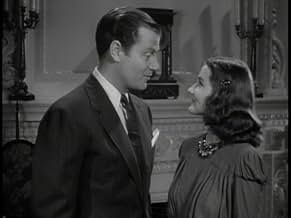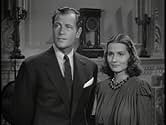After Barry Corvall discovers that his new bride is a possible enemy agent, he resigns from the diplomatic service to go undercover to root out an espionage ring planning to destroy American... Read allAfter Barry Corvall discovers that his new bride is a possible enemy agent, he resigns from the diplomatic service to go undercover to root out an espionage ring planning to destroy American industrial capability.After Barry Corvall discovers that his new bride is a possible enemy agent, he resigns from the diplomatic service to go undercover to root out an espionage ring planning to destroy American industrial capability.
- Awards
- 1 win total
Rudolph Anders
- Paul Strawn
- (as Robert O. Davis)
Hans Heinrich von Twardowski
- Dr. Helm
- (as Hans Von Twardowski)
Emmett Vogan
- Instructor
- (as Emmet Vogan)
Featured reviews
There is little doubt in this film that World War II is about to begin. In fact, it was released just twenty-one days after the invasion of Poland by German forces and was in production long before. Scare tactics aside, the movie reveals real fears during the months preceding the war. Spies, counterspies, terror, suspicions, and other prologues to war gave ample warning of renewed global conflict. This movie reflects that warning.Viewing this film leads one to wonder, given the ample clues, how the war could surprise anyone.
Joel McCrea is a member of the foreign service who inadvertently marries a part-time spy in "Espionage Agent."
This is a very interesting film for several reasons. War is about to break out in Europe, and the U. S. is planning to stay neutral, and in fact, in one scene, an American broadcaster gives a call for neutrality.
After getting into the U. S. on a forged passport, McCrea's wife, played by the darkly beautiful Brenda Marshall, confesses her past associations, and states that she's been approached to do more favors for an espionage group. McCrea resigns his post, and with his wife's help, sets out to expose the spy network in the U. S.
In the aftermath of 9/11, watching a 67-year-old film where a group of people have agents in place throughout the country and sites ready to bomb is chilling.
There are some tense, exciting scenes and an attractive cast, but the film is more of historical interest than anything else. Look for TV Superman George Reeves in a very small, uncredited role.
This is a very interesting film for several reasons. War is about to break out in Europe, and the U. S. is planning to stay neutral, and in fact, in one scene, an American broadcaster gives a call for neutrality.
After getting into the U. S. on a forged passport, McCrea's wife, played by the darkly beautiful Brenda Marshall, confesses her past associations, and states that she's been approached to do more favors for an espionage group. McCrea resigns his post, and with his wife's help, sets out to expose the spy network in the U. S.
In the aftermath of 9/11, watching a 67-year-old film where a group of people have agents in place throughout the country and sites ready to bomb is chilling.
There are some tense, exciting scenes and an attractive cast, but the film is more of historical interest than anything else. Look for TV Superman George Reeves in a very small, uncredited role.
Want to know how much difference a director can make? Watch this film, with Joel McCrea as a blundering American naïf in Europe on the eve of World War II exposing an Axis spy plot under the hacky direction of Lloyd Bacon, and then watch "Foreign Correspondent," which McCrea made the next year in a similar role, similar plot, at least one supporting cast member (Martin Kosleck) in common and even another sequence set during a rainstorm -- but under the direction of Alfred Hitchcock. "Espionage Agent" isn't a bad movie and it probably would be a lot more likable if McCrea hadn't made "Foreign Correspondent" (albeit playing a terminally naïve journalist instead of a terminally naïve diplomat) a year later.
Incidentally, the comment by "bkoganbing" is wrong. Though the film begins in 1915, it quickly leaps forward to 1936 (the year the Spanish Civil War broke out) and the bulk of it takes place in the late 1930's -- though, even so, the German uniforms are otherwise correct but their armbands are missing the swastika. Even after making "Confessions of a Nazi Spy" (which was about Nazi abuses in the U.S., not in their homeland), Warners was still being skittish about directly taking on the German government.
Incidentally, the comment by "bkoganbing" is wrong. Though the film begins in 1915, it quickly leaps forward to 1936 (the year the Spanish Civil War broke out) and the bulk of it takes place in the late 1930's -- though, even so, the German uniforms are otherwise correct but their armbands are missing the swastika. Even after making "Confessions of a Nazi Spy" (which was about Nazi abuses in the U.S., not in their homeland), Warners was still being skittish about directly taking on the German government.
Joel McCrea is training for the US diplomatic service when he meets refugee Brenda Marshall and marries her. Soon. She confesses she is a low-level spy, but loves him so much that she is willing to have her secret outed. When they go to McCrea's bosses, they kick him out of the service, but he and Miss Marshall decide to do some counterspying on their own.
It's the second movie in 1939 that Warners made about the German threat. True, the country is never named, and the uniforms worn merely suggest it, but only Universal had made a stand earlier, and that went away with the Laemmles. This is quite obviously not a major production, and Warners was risking no major assets. They borrowed McCrea from Paramount, and this was Miss Marshall's first credited role. Director Lloyd Bacon obviously shot this on the cheap in his usual high-speed manner, but there's a strident call for tougher anti-espionage laws, and the Foreign Service is talked up as "America's first line of defense."
Cryptography buffs will snort when the new mechanical encryption system is talked up. It boasts over 2700 possible cyphers!
It's the second movie in 1939 that Warners made about the German threat. True, the country is never named, and the uniforms worn merely suggest it, but only Universal had made a stand earlier, and that went away with the Laemmles. This is quite obviously not a major production, and Warners was risking no major assets. They borrowed McCrea from Paramount, and this was Miss Marshall's first credited role. Director Lloyd Bacon obviously shot this on the cheap in his usual high-speed manner, but there's a strident call for tougher anti-espionage laws, and the Foreign Service is talked up as "America's first line of defense."
Cryptography buffs will snort when the new mechanical encryption system is talked up. It boasts over 2700 possible cyphers!
Warner Brothers really could have used a better script for this mishmash of a movie which managed to juxtapose the events of World War I into the days before World War II.
The film opens with a description of the famous Black Tom explosion of a munition factory located on an island in the middle of the Hudson River. You can still see the remnants of it today. This occurred before World War I and was traced to German saboteurs then.
The message is quite clear, America needs to have its own espionage agency and we got one with the formation of the Office of Strategic Services as World War II broke out. Until then such distasteful spying matters was handled within the State Department.
Joel McCrea is a foreign service officer who marries refugee Brenda Marshall. Problem is that Marshall had gotten help from the Germans and they expect some help in return. Of course she's in love with her new husband and she refuses and exposes their contact man, Martin Kosleck.
With McCrea's dismissal from the foreign service, the newlyweds decide to form there own plan to expose the German's secret espionage network with a little spying of their own. How they manage is the rest of the film.
For a film that supposedly takes place before American entry into World War I, why is that everyone is dressed in the Nazi uniforms of the Thirties? Everything is there but the swastika. There's not even any kind of effort with music or sets to set the film in its proper time frame.
The only reason this gets as much as three stars is a tribute to the players involved. Joel McCrea was simply in a dress rehearsal for the far better Foreign Correspondent he would do the following year.
The film opens with a description of the famous Black Tom explosion of a munition factory located on an island in the middle of the Hudson River. You can still see the remnants of it today. This occurred before World War I and was traced to German saboteurs then.
The message is quite clear, America needs to have its own espionage agency and we got one with the formation of the Office of Strategic Services as World War II broke out. Until then such distasteful spying matters was handled within the State Department.
Joel McCrea is a foreign service officer who marries refugee Brenda Marshall. Problem is that Marshall had gotten help from the Germans and they expect some help in return. Of course she's in love with her new husband and she refuses and exposes their contact man, Martin Kosleck.
With McCrea's dismissal from the foreign service, the newlyweds decide to form there own plan to expose the German's secret espionage network with a little spying of their own. How they manage is the rest of the film.
For a film that supposedly takes place before American entry into World War I, why is that everyone is dressed in the Nazi uniforms of the Thirties? Everything is there but the swastika. There's not even any kind of effort with music or sets to set the film in its proper time frame.
The only reason this gets as much as three stars is a tribute to the players involved. Joel McCrea was simply in a dress rehearsal for the far better Foreign Correspondent he would do the following year.
Did you know
- TriviaThe working title of this picture was "Career Man". It was released little over four months after another socially conscious Warner anti-Nazi film, Les aveux d'un espion nazi (1939). This was before America's involvement in WWII, when other studios were reluctant to antagonize the Germans. Reviews compared the film to Les aveux d'un espion nazi (1939) because of its exposé about espionage. The theme of Nazi Germany trying to disable the industrial capabilities of the U.S. would be taken up again in Alfred Hitchcock's "Saboteur" (1942), after America's entry into the war.
- GoofsGeorge Bancroft is credited onscreen as Dudley Garrett, but radio announcer Wendell Niles introduces him as Donald Garrett.
- Quotes
State Department Official: Will we in this nation ever learn the difference between tolerance and stupidity?
- ConnectionsReferenced in Une lueur dans la nuit (1992)
- SoundtracksI'll Sing You a Thousand Love Songs
(1936) (uncredited)
Music by Harry Warren
Dance music played after the marriage announcement
Details
- Release date
- Country of origin
- Language
- Also known as
- Espionage Agent
- Filming locations
- Union Station - 50 Massachusetts Avenue NE, Washington, District of Columbia, USA(establishing shot - exterior - archive footage)
- Production companies
- See more company credits at IMDbPro
- Runtime
- 1h 23m(83 min)
- Color
- Sound mix
- Aspect ratio
- 1.37 : 1
Contribute to this page
Suggest an edit or add missing content


